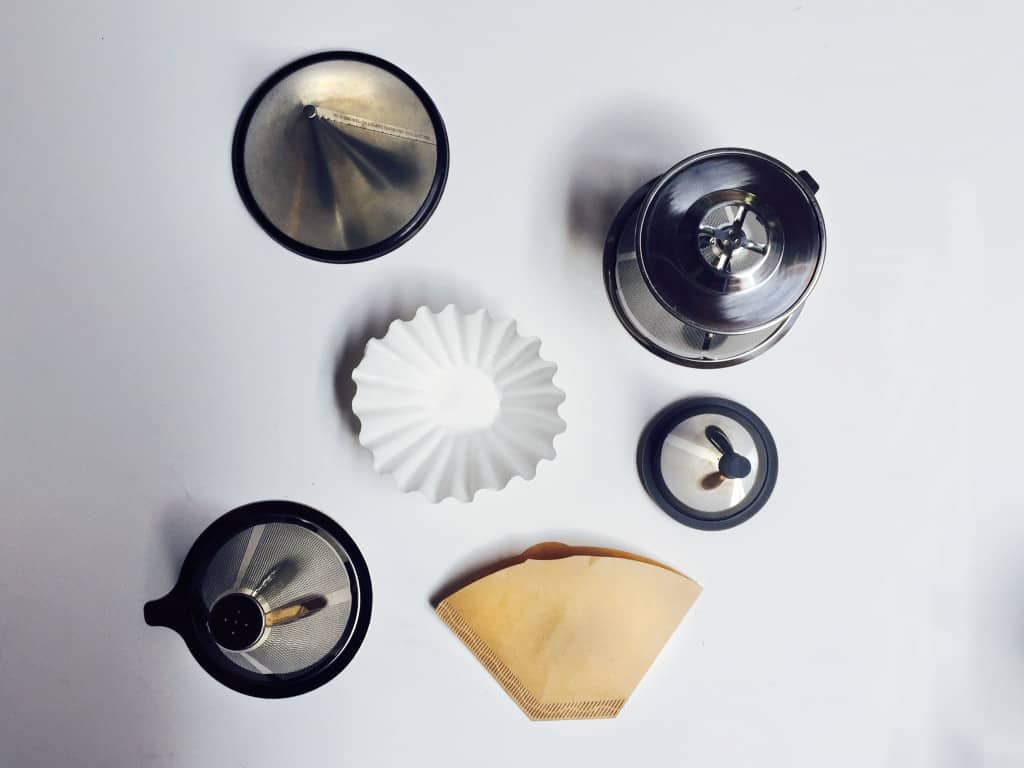Some folks ask us what’s the difference between a paper and metal filter when brewing. A lot, actually. From flavor to process, there’s quite a few differences between paper and metal filters. If you’re not sure which is right for you, we’ve compiled a list of differences between the two.
Paper filters have a lot of benefits. They're cheaper than metal filters, and they're also easy to find. You can buy them at any grocery store, and they come in a variety of shapes and sizes. Paper filters remove most of the coffee's natural oils resulting in a clean, light, and vibrant tasting cup. One drawback to using paper filters is that they're not reusable: you’ll need to keep restocking your supply or else face the dreaded morning of an empty box of filters.
Metal filters, on the other hand, allow more of the coffee's natural oils and flavor to seep through. This can make the coffee taste richer and more full-bodied. Metal filters are also reusable, which makes them more environmentally friendly. The only downside to using metal filters is that they're less common. As a result, you might have to order them online or find them at a specialty store. However, the reusability makes them extremely convenient and worth the investment for many people.
So, which is better? Before you make a decision, take a look at our in-depth breakdown of just how different these two types of filters are. That way, you can weigh the pros and cons before choosing your preferred coffee lifestyle.
Paper Filters
For a majority of drip methods, paper filters are the common choice. Some brew methods that use paper filters: pour-over cone drippers, pour-over flat bottom drippers, automatic drip machines and Aeropress.
Cleanup – Relatively easy, just fold up the paper filter with grinds and toss in the trash. If you’re a frequent pour-over brewer, running across the kitchen with a dripping wet sack of grinds can get annoying.
Sediment – Paper filters do a great job of removing almost all sediment from your coffee.
Oils – Paper filters remove all coffee oils from your cup. We’re a 50/50 split on coffee oils, it’s completely a personal taste preference. If you are concerned about cholesterol however, coffee oils contain cafestol which is a stimulator of LDL cholesterol levels. If you have any cholesterol concerns consult your doctor.
Reuse – One of the biggest drawbacks to a paper filter is they aren’t reusable. Environmentally conscious folks opt out of paper for this reason.
Cost – A box of 100 papers is usually $5.00. Keep in mind, you do have to keep buying them.
Taste – Because paper filters are so good at preventing grit from entering your cup, the result is a light, vibrant cup.

Metal Filters
Metal filters cover a wider range of brew methods from drip to espresso. Some methods that use metal filters: pour-over (with filters like the Kone filter), Prismo on the AeroPress, French press, percolator, moka pot, espresso and of course Duo Coffee Steeper.
Cleanup – Dispose of grinds in the trash and rinse off or throw filter in the dishwasher.
Sediment Levels – Sediment levels vary greatly for metal filters. Brewing with a French press, for example, will leave a lot of sludge in your cup. Conversely, brewing with the Kone filter or Duo Coffee Steeper’s inverted etched filter lets only a small amount of micro-fines through.
Oils – Metal filters do not absorb coffee oils. These oils create a rich coffee flavor that is purely a taste preference.
Reuse – Your metal filter will last years.
Cost – Metal filters are more expensive, however they will last you a long time.
Taste – Provides a cup with a full-bodied, smooth flavor profile.
How to Decide Between a Paper and Metal Pour-Over Coffee Filter
Now that you know the nitty-gritty details of what makes paper and metal filters tick, let's figure out what that means for your cup of coffee.
1. What Flavors Do You Prefer in Your Coffee?
If you're after a light, bright, delicate cup with a high clarity of flavor, then a paper coffee filter is going to be your best bet. The paper filter absorbs a lot of the coffee's oils, which can give your coffee a heavier body. Metal coffee filters, on the other hand, do not absorb any of the coffee's oils. This results in an aromatic cup of coffee with more richness and depth of flavor.
You also need to think about how much sediment you want in your coffee. This one's pretty easy. If you want a clean cup with little to no sediment, go with paper. The paper filter is going to do a better job of trapping all the coffee grounds, whereas metal filters will let some sediment through.
If you like the idea of a metal filter but aren't so keen on sediment, you can always go for a fine etched metal pour-over coffee filter. This will keep the majority of the grounds out of your cup without affecting the flavor of your coffee.
2. How Much Do You Want to Spend on a Pour-Over Filter?
Paper filters are the most inexpensive option, with a box of 100 costing around $5. This might not seem like much, but if you're a daily coffee drinker, those paper filters can start to add up.
Metal filters are a more expensive investment upfront, costing anywhere from $20 to $50 depending on the brand, package, and level of filtration you're looking for. However, they will last years, so in the long run, they are significantly more cost-effective.
3. How Much Time Can You Dedicate to Cleaning?
Cleaning up after using a paper filter is a simple throw away affair. They are single use and your biggest clean-up issue is likely to be the trail of coffee drops they may leave while you dash to the trash. However, we do recommend that you rinse your paper filters with water before you begin your brewing process, to remove any papery taste from your coffee.
Metal filters, on the other hand, require a little more upkeep. You'll need to rinse them off after each use and put them in the dishwasher every so often to give them a good deep clean.
If you're someone who likes to set it and forget it, paper is probably the way to go. If you don't mind taking a few extra minutes to clean your filter, then metal is a great option.
Making a new habit can be easier than you think when something really matters to you. So if you want to be more environmentally conscious, or you're just tired of spending money on paper filters, making the switch to metal might not be as difficult as you think.
Overall there’s positives and negatives to each filter, however most of these pros and cons come down to personal preference. Will throwing out a paper filter be easier than throwing a filter in the dishwasher? Do you like coffee oils? Do you prefer a delicate, clean brew to a full-bodied, richer taste? As always, if you’re not sure about these questions we encourage you to experiment!






